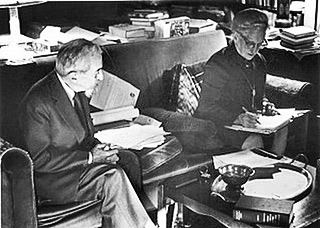By George Wyatt, President of the Johnson O’Connor Research Foundation from 1978-1993
The central conviction of Johnson O’Connor’s creed was quite simple: all human beings should have the opportunity to develop their natural abilities, “their distinctive gifts,” so they can attain fulfillment in their lives and, through these gifts, contribute to society. For Johnson O’Connor, the suffering of oppressed people in many areas of the world was a tragedy not only because of their appalling living conditions but also because of the colossal waste of talent, of human potential. That millions of human beings would live out their lives with their aptitudes lying dormant within them—lives unfulfilled and communities impoverished—was the greatest tragedy of all. O’Connor believed that everyone has aptitudes and can make his or her contribution to society if given the opportunity.
Just as Johnson O’Connor was concerned about people who lacked the material conditions to live fruitful lives, so he deplored the plight of women in society. In this regard, as in so many other matters, he was years ahead of his time. He rejected completely the ignorant belief that women were inferior to men in their abilities. In fact, apart from the spatial aptitude, where men have a clear advantage, women have the edge. O’Connor used to say jokingly that for years he had been trying, but without success, to find another aptitude where men score higher than women.
If O’Connor were alive today, he would be pleased with the progress women have made since the early sixties in medicine, science, and business. Some forty years ago, if we told a woman she had a management pattern, she would often say, “What good is that to me? I’m not a man.” Now she says “Good! I’ll get an M.B.A.”

Johnson and Eleanor Manning O’Connor at work on aptitude testing research. Despite a thriving career as an architect and university lecturer, Eleanor Manning was deeply involved in the work of the Human Engineering Laboratory. At one point, aptitude testing was even based out of their home, just a few doors down from our current headquarters in Boston.
Johnson O’Connor’s wife, Eleanor Manning O’Connor, was closely associated with the Foundation from the early 1930s until her death in 1973. Mrs. O’Connor, a distinguished architect and lecturer in architectural history, was born in 1884 and graduated from the Massachusetts Institute of Technology in 1906. Her life was an inspiration to scores of women who came to the Foundation in their quest for more career opportunities.
Although the number of women seeking work outside the home increased at the beginning of the sixties, most of the jobs available to women were limited to fields such as office work, elementary and high school teaching, nursing, and library science. Mrs. O’Connor encouraged women with the appropriate aptitudes to go into engineering, architecture, medicine, and science—occupations traditionally monopolized by men. She wanted women to realize more of their possibilities. If a woman in her mid-fifties came to be tested, and said to Mrs. O’Connor, “I wish I knew all this twenty years ago; it’s too late now,” Mrs. O’Connor would be furious and say, “Go out and do it! You have twenty or thirty years ahead of you; are you going to waste them?” In her late eighties, Mrs. O’Connor herself was still lecturing part-time in architectural history and house planning.
Johnson O’Connor’s work always centered on the measurement of aptitudes and English vocabulary. An aptitude can be described as a natural bent, talent, or gift for doing or learning to do something quickly, or relatively quickly. To develop an aptitude, however, one must acquire knowledge and skill. Hundreds of years ago Francis Bacon wrote, “Natural abilities are like natural plants that need pruning by study.” We all know that a gifted athlete must master the technique of his particular sport in order to reach his full potential as an athlete, just as a gifted musician must master the technique of his particular musical instrument to become a first-rate musician. To accomplish this, we know, requires much study and practice. Without knowledge, aptitudes are of little help in the long run.
Johnson O’Connor was always reminding people that the ability to think correctly also depended on knowledge. To score high on the Foundation’s Inductive Reasoning test would not in itself mean that one could think quickly and accurately, only that one possessed the latent ability to do so. A constant refrain of O’Connor’s was, “Get the facts. First the facts.” His question was always: If a great deal of knowledge exists about a particular topic or subject, and a person knows only a small amount of that knowledge, how could he expect to reach a correct conclusion, to make the right inference? Even if he did manage to do so, O’Connor would not have been impressed. He would have used another of his favorite expressions: “You are not thinking correctly.” To O’Connor, to reach the right conclusion based on insufficient evidence was an example of sloppy thinking. He was concerned with the grounds of one’s belief–what is the evidence for believing something to be true?
As most people who are familiar with the work of the Foundation know, O’Connor was passionately interested in words and believed that a large English vocabulary was extremely important in life. As O’Connor expressed it:
An extensive knowledge of the exact meanings of English words accompanies outstanding success in this country more often than any other single characteristic that the Human Engineering Laboratory and the Johnson O’Connor Research Foundation have been able to isolate and measure.
Why is this so? According to O’Connor, the answer seems to be the words are the tools with which we think, and with which we grasp the thoughts of others. Johnson O’Connor was unyielding in his opposition to those who believed that only usage really mattered; that standards of right and wrong, correct and incorrect, were irrelevant. To those people, “uninterested” and “disinterested” were synonyms, as were “presently” and “currently.” “We can’t let the ignorant define our words for us,” he would argue. He didn’t think the ability to spell was too important. Many thousands of highly educated men and women can’t spell, he would say, including many successful writers. O’Connor’s interest in spelling was solely in trying to determine whether the ability to spell was an aptitude, a type of visualizing skill.
Although Johnson O’Connor was always concerned that young people who had decided to specialize should receive the knowledge and training necessary for their success, he firmly believed they should first receive a thorough grounding in the liberal arts, either formally or informally, and only then concentrate in their chosen fields. In O’Connor’s view, acquiring a liberal education did not necessarily mean attending college. He maintained that if one lived for two years in a great modern city and took advantage of its cultural facilities—the theater, concerts, films, art galleries, libraries, lectures, parks, and zoological gardens—one could obtain as good an education as one could receive in four years at many colleges.
Like most of us, Johnson O’Connor was a bundle of contradictions, though on some occasions the contradiction was more apparent than real. For example, though he repeatedly advised one to “get the facts,” when discussing education he quite often would exhort someone to “forget the facts.” He meant that the value of a liberal education does not exist in collecting facts or accumulating knowledge but in the quickening of one’s sensibilities, in enlarging one’s vision of life—in short, in making one more alive. O’Connor often remarked that although he had forgotten just about everything he had learned at Harvard, his experience there had changed forever the way he looked at the world.
Johnson O’Connor, like Mrs. O’Connor, was an avid traveler, immensely curious and open to new experiences. Even in his eighties he always tried to learn something of the language of the country he was visiting. Mrs. O’Connor used to say that when they were abroad and dining out they never knew what food they were getting until it arrived because O’Connor insisted on ordering the meal in that country’s language even though the waiters invariably spoke English. Not only did O’Connor enjoy travel, he also found it an exciting way to continue his education, which he thought of as a life-long process of self-discovery, beginning in earnest only after one had left college.
Johnson O’Connor never wasted time dwelling on misfortunes or mistakes. He would learn what he could from them and then move on. He lived in the present. To him, it was simply a waste of time and energy to be preoccupied with something you couldn’t change. “Don’t waste my time talking about the past,” he would say. “What are we going to do now?” While O’Connor had plans, goals, and visions for the future, he knew they could only be realized by working toward them day by day. Those of us who worked with him will always remember his admonitions: “Do it now!” or “Follow through!” The view expressed by Oscar Wilde in his witticism, “I never put off till tomorrow what I can possibly do…the day after,” was the exact opposite of Johnson O’Connor’s attitude. George Bernard Shaw better reflected O’Connor’s view of life:
This is the true joy in life, the being used for a purpose recognized by yourself as a mighty one; the being thoroughly worn out before you are thrown on the scrap heap; the being a force of nature instead of a feverish selfish little clod of ailments and grievances complaining that the world will not devote itself to making you happy.
As we know, O’Connor’s purpose was discovering innate abilities and conducting research into how we learn. Early in the 20th century, he questioned the prevalent hypothesis of a general intelligence, which implied that a person was bright or dull. O’Connor believed there were many kinds of intelligence, that one could be bright in one area, but not in another. The saying, “Every person is my superior in some respect,” expressed O’Connor’s view perfectly. To quote directly from O’Connor:
Many attempts to measure human beings have failed because they have treated the individual as a machine, dealt with him cold-bloodedly. They have arranged boys on an arbitrary intelligence scale running from zero at the bottom to one hundred at the top in such a way that everyone, except the one top individual, is discouraged, made to feel inferior to someone else. The application of science to the study of man must be inspiring, not disheartening, strengthening, not weakening. It must aim first to prove to each individual that he possesses a unique combination of abilities, one which the world has perhaps never seen before, and one which he can use to new purposes, to create new things, new thoughts. And, having convinced him of his own strengths, it must then show him in what practical, concrete ways he can best use his particular combination of characteristics.
Johnson O’Connor never discussed politics except to say that he cared nothing for political labels such as left-wing or right-wing, that he always asked himself what would be the likely effects on individuals or on society if a proposed measure became law. One had the distinct impression he was too independent a thinker to belong to any political party.
Johnson O’Connor was a born teacher, able to explain even complicated subjects in a manner that was simple, clear, and interesting and like all born teachers, he inspired in others a desire to learn because his enthusiasm for a subject communicated itself to his listeners.
Johnson O’Connor possessed considerable creative energy, a great capacity for work, and was always open to new ideas. Although he was not always an easy man to work with, to collaborate with him on a project was always exciting. During his lifetime, O’Connor’s research findings helped hundreds of thousands of men and women lead constructive lives, bringing to them a sense of fulfillment. Since his death we have continued the work he began in 1922, studying human abilities and testing tens of thousands more in many cities across the country, and we have every reason to believe that the Foundation will continue well into the future.
Johnson O’Connor would have liked that.
















